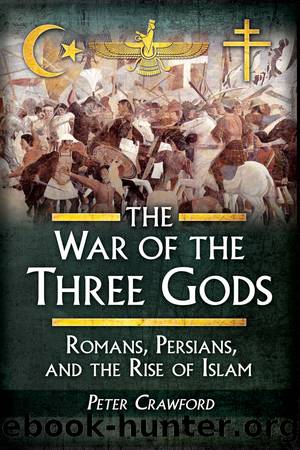The War of the Three Gods: Romans, Persians, and the Rise of Islam by Peter Crawford

Author:Peter Crawford [Crawford, Peter]
Language: eng
Format: epub
Tags: history, Ancient, Rome, Biography & Autobiography, Military, Historical
ISBN: 9781632201782
Google: 7yuCDwAAQBAJ
Publisher: Simon and Schuster
Published: 2014-09-16T23:37:49.288519+00:00
Chapter 7
636âThe Year of the Muslim Beast
God helping him, [Heraclius] discovered, that his empire would be laid waste by circumcised races.
Fredegarius, Chron. 65
The Death of Abu Bakr, the Succession of Umar and the Fall of Damascus
In the aftermath of Ajnadayn, it is suggested that the Romans attempted to disrupt Muslim movements by destroying river crossings and even the river banks, flooding much of the Jordan valley. However, while the Muslims do seem to have moved back east of the Jordan, ostensibly giving chase to Roman forces that survived the battle but perhaps also to prevent an overextension of their lines of communication, it did little to prevent Muslim advances continuing apace. The next targets were the twin cities of Pella and Scythopolis, also known as Fahl and Baysan, which sat almost directly opposite each other across the Jordan. Another Khalid victory before the walls of Pella saw the city invested in perhaps a four-month blockade before capitulating, while Scythopolis seems to have fallen to Amr and Shurahbil without a fight. The exact dates of Ajnadayn and these subsequent manoeuvrings around the Jordan are disputed with some placing Ajnadayn as late as January 635 but the more likely dating is in late-July 634. This earlier date is usually preferred as âit is generally supposed to have occurred during the last months of Abu Bakrâs caliphate, and the news of the Muslimâs victory is supposed to have reached him on his deathbed.â1
Abu Bakr fell ill in early-August 634 after catching a chill; although there is some suggestion that it was the lingering effects of being poisoned a year previously. Realising he was dying and wary of the potential for a repeat of the infighting that had marred the death of the Prophet, Abu Bakr, after much consultation with his advisers and colleagues, decided to appoint his own successor. The choice eventually fell on Umar b. al-Khattab. Having pronounced his choice and composed his will, Abu Bakr died on Monday 23 August 634 and was buried beside Muhammad. Despite having his detractors as someone who usurped the caliphate from Ali, Abu Bakr had been an invaluable early supporter of and adviser to Muhammad. Once he assumed power, by whatever means, it is difficult to deny his territorial successes. By building on the religious, social and political foundations established by the Prophet, in a little over two years as caliph Abu Bakr had taken the Arab caliphate from part of a network of alliances across the Arabian Peninsula to a burgeoning pan-Arabic state capable of squaring up to and defeating two of the most powerful empires of the ancient world.
Download
This site does not store any files on its server. We only index and link to content provided by other sites. Please contact the content providers to delete copyright contents if any and email us, we'll remove relevant links or contents immediately.
Machine Learning at Scale with H2O by Gregory Keys | David Whiting(4282)
Never by Ken Follett(3921)
Harry Potter and the Goblet Of Fire by J.K. Rowling(3834)
Unfinished: A Memoir by Priyanka Chopra Jonas(3361)
Fairy Tale by Stephen King(3355)
The Man Who Died Twice by Richard Osman(3055)
Will by Will Smith(2891)
Rationality by Steven Pinker(2340)
It Starts With Us (It Ends with Us #2) by Colleen Hoover(2318)
Can't Hurt Me: Master Your Mind and Defy the Odds - Clean Edition by David Goggins(2309)
The Dark Hours by Michael Connelly(2289)
The Storyteller by Dave Grohl(2212)
Friends, Lovers, and the Big Terrible Thing by Matthew Perry(2208)
The Becoming by Nora Roberts(2178)
The Dawn of Everything: A New History of Humanity by David Graeber & David Wengrow(2177)
The Stranger in the Lifeboat by Mitch Albom(2104)
Cloud Cuckoo Land by Anthony Doerr(2080)
Love on the Brain by Ali Hazelwood(2046)
Einstein: His Life and Universe by Walter Isaacson(1997)
